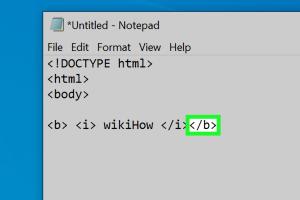Create Bold and Italicized Text in HTML: A Comprehensive Guide

-
Quick Links:
- Introduction
- Understanding HTML Tags
- Using Bold Text in HTML
- Using Italicized Text in HTML
- Best Practices for Text Formatting
- Real World Examples
- Case Studies
- Expert Insights
- FAQs
Introduction
In the world of web development, text formatting plays a crucial role in enhancing the readability and aesthetic appeal of a website. Among the basic yet essential formatting techniques are bold and italicized text. This guide aims to provide a thorough understanding of how to create bold and italicized text in HTML, catering to both beginners and experienced developers. By the end of this article, you'll be equipped with the knowledge to apply these formatting styles effectively.
Understanding HTML Tags
HTML (HyperText Markup Language) is the standard language used to create web pages. It uses a system of tags to define elements on a page, including text formatting. The two primary tags for bold and italicized text are:
- <b> - Used to make text bold.
- <i> - Used to make text italicized.
These tags may seem straightforward, but understanding their context and proper usage is essential.
Using Bold Text in HTML
To create bold text in HTML, you can use either the <b> or <strong> tag. While both render text in bold, there is a difference in their semantic meanings:
- The
<b>tag is used purely for visual effect. - The
<strong>tag conveys that the text is of strong importance.
Example of Using Bold Text
<b>This text is bold</b>
<strong>This text is also bold but important</strong>When rendered, the above code will display:
This text is bold This text is also bold but important
Using Italicized Text in HTML
Similarly, to create italicized text, you can use the <i> or <em> tag:
- The
<i>tag is for visual styling. - The
<em>tag indicates emphasis on the text.
Example of Using Italicized Text
<i>This text is italicized</i>
<em>This text is also italicized but emphasized</em>When rendered, the above code will display:
This text is italicized This text is also italicized but emphasized
Best Practices for Text Formatting
While creating bold and italicized text is simple, adhering to best practices ensures that your content remains user-friendly and accessible:
- Use
<strong>and<em>for semantic importance. - Avoid overusing bold and italic styles, as it can overwhelm readers.
- Ensure that your text remains legible against the background color.
Real World Examples
Understanding how to apply bold and italic text in realistic scenarios can enhance your web development skills. Here are a few examples:
- Blog Posts: Use bold for headings and italic for quotes to improve readability.
- Product Descriptions: Highlight key features in bold and instructions in italics.
Case Studies
Let’s look at how different websites implement bold and italic text:
Case Study 1: News Website
A leading news website uses bold headlines to draw attention to the most important stories. Italics are used for quotes and to emphasize specific phrases, enhancing the article's impact.
Case Study 2: E-commerce Site
An e-commerce site employs bold font for product names and italicized text for customer reviews, making it easier for customers to navigate through products and read feedback.
Expert Insights
According to web design experts, effective text formatting can significantly improve user experience. Semantic HTML tags not only enhance accessibility but also improve SEO performance. Integrating bold and italicized text appropriately can lead to better engagement and lower bounce rates.
FAQs
1. What is the difference between <b> and <strong>?
The <b> tag is used for visual styling, while <strong> conveys importance.
2. Can I use CSS to create bold and italic text?
Yes, CSS can be used to style text, but using HTML tags is the standard method for semantic meaning.
3. Is it better to use <em> or <i> for italic text?
The <em> tag is preferred for indicating emphasis, while <i> is for style.
4. How can I ensure accessibility with bold and italic text?
Use semantic HTML tags and ensure sufficient contrast with the background color.
5. Are there any SEO benefits to using bold and italic text?
Yes, semantic tags help search engines understand the importance of content, potentially improving SEO.
6. Can I combine bold and italic text in one tag?
Yes, you can nest tags like this: <strong><i>Important Text</i></strong>.
7. What browsers support bold and italic HTML tags?
All modern browsers support <b>, <strong>, <i>, and <em>.
8. Can I style other tags to be bold or italic?
Yes, you can apply CSS styles to any HTML element to change its font weight or style.
9. What should I avoid when using bold and italic text?
Avoid overusing these styles, as it can clutter your text and reduce readability.
10. How do I test if my bold and italic text is accessible?
Use accessibility tools or browser extensions to check color contrast and readability.